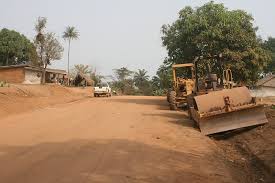Commercial drivers across Liberia face significant challenges as road construction and maintenance efforts have stalled under President Joseph Nyuma Boakai’s administration. The delays in road development not only extend travel times but also increase fuel consumption, compelling drivers to raise fares to maintain their profitability. Public Works Minister Roland Giddings recently outlined a comprehensive plan involving 15 major road projects intended to address these issues within the first 100 days of the administration. Unfortunately, of these projects, only two have reached full completion, while the majority remain either partially finished or are waiting for the end of the rainy season to progress.
The completed projects include a 37 km road connecting Ganta to Sanniquellie and a 6.1 km stretch from the ELWA Junction to the Coca-Cola Factory. Other roads, such as the one from Gbanga to Salayea, are nearly complete, while several vital routes, including those from Sanniquellie to Logatuo, and Kilipo to Fishtown, are also partially finished. Despite the efforts being made, the completion rates for many of the remaining nine projects are disheartening, as they are below 50%. Minister Giddings attributed the slow progress primarily to the challenges posed by the rainy season, leaving citizens and businesses increasingly anxious about the impact on regional economic activities.
Residents and local business owners have expressed their concerns about the deteriorating state of the roads. For example, Easter Jabbah, a plantain seller who sources goods from various counties for sale in the Red-Light market in Paynesville, articulated the detrimental effects that poor road conditions have on her ability to run her business effectively. Damage to goods during transport not only threatens her profit margins but also places additional pressure on the already fragile local economy. The frustrations are echoed by local transport providers, whose increased operational costs due to longer travel times have led them to hike fares, thus complicating the situation for everyday commuters and traders.
Minister Giddings reassured the public that the government is aware of the pressing issues and intends to address them effectively during the ongoing rainy season. He emphasized ongoing efforts to maintain city streets and repair damaged areas, which are vital for local commuting and trade. To aid in these efforts, the government has engaged the China Road and Bridges Corporation to construct a new overpass bridge in front of the EJS Ministerial Complex, with groundbreaking planned for January. Additionally, a community outreach effort will begin, focusing on the demolition of houses in specific areas to facilitate road repairs, particularly in Montserrado.
Minister Giddings’ statements regarding the focus on local roads, including the Chicken Soup Factory Road, highlight a commitment to improving infrastructure. As part of the government’s broader strategy, steps are being taken to procure contractors capable of addressing pothole issues across various neighborhoods in Monrovia. However, there remains uncertainty about whether the promised 20 yellow machines from the president will be utilized in the process, which could greatly enhance the speed and efficiency of the repairs.
As the first year of President Boakai’s term unfolds, the interplay between infrastructure projects and local commerce remains critical for the economic stability of Liberia. The frustrations of drivers and business owners reflect broader issues within the country’s transport and trade systems, contingent upon effective governance and sustained investment in infrastructure. How quickly and efficiently these projects are completed will significantly influence not just profitability for drivers but also the overall economic health of the communities relying on these transport routes. Thus, stakeholders are keenly watching for tangible outcomes from the government’s intervention strategies in the months ahead.














